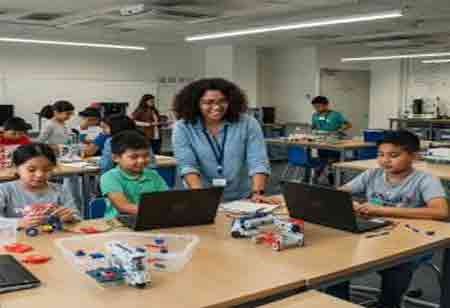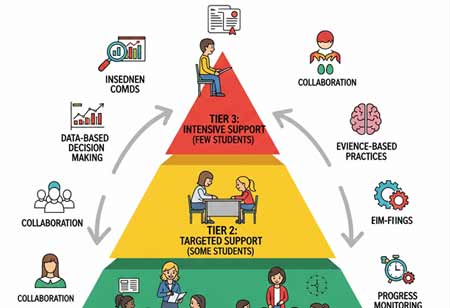THANK YOU FOR SUBSCRIBING
Be first to read the latest tech news, Industry Leader's Insights, and CIO interviews of medium and large enterprises exclusively from Education Technology Insights
Why STEM Education Is Key to Global Leadership
STEM education develops critical thinking, career preparedness, and diversity and prepares the next generation for success in a fast-paced world as it trains the next set of innovators.

By
Education Technology Insights | Friday, September 05, 2025
Stay ahead of the industry with exclusive feature stories on the top companies, expert insights and the latest news delivered straight to your inbox. Subscribe today.
Fremont, CA: STEM education serves as the key to modern learning, equipping students with the essential skills and knowledge needed to navigate today’s fast-paced, technology-driven world. As global industries expand, the demand for skilled professionals in science, technology, engineering, and mathematics continues to surge. More than just technical expertise, STEM education cultivates critical thinking, creativity, problem-solving abilities, and collaboration skills that are crucial for success in an increasingly interconnected and complex society.
The students are presented with real-world problems that require logical reasoning and analytical thinking, which helps them break down complex challenges, evaluate solutions, and make informed decisions. These skills are critical in scientific and technical careers and everyday life. STEM education encourages creative thinking and innovative solutions, which are crucial in an ever-changing world. Thus, STEM education is a valuable tool for students.
In addition to solving problems, STEM education emphasizes hands-on learning and experimentation. This experiential approach allows students to deal with the subjects being taught head-on, making for deeper understanding and knowledge retention. Experiments, projects, and design challenges enable the practical experience of applying theoretical concepts in the real world. This enhances their technical knowledge and develops confidence in their ability to take on complex tasks and overcome challenges. When the students can view the results of their work in real time, motivation for the subject matter grows and stays for life.
STEM education prepares students for high-demand industries like healthcare, renewable energy, artificial intelligence, and space exploration. Students can pursue engineering, data analysis, and programming careers by developing technical expertise in math, science, and technology. These STEM-related professions are projected to increase, making STEM education crucial in addressing workforce shortages and preparing future generations for the challenges and opportunities of the global economy.
STEM education also has the importance of addressing workforce shortages and ensuring future generations are well-prepared for the challenges and opportunities of the worldwide economy. STEM education can help bridge the gap of gender and socioeconomic disparities in underrepresented fields, hence making a more inclusive and equitable workforce. Initiatives that encourage girls and diverse students to pursue STEM careers can increase the potential for a more diverse workforce. Early exposure to STEM subjects develops confidence in one's abilities and challenges stereotypes, leading to better problem-solving and inclusive innovation.
STEM education fosters teamwork and collaboration because group projects require people to share ideas, divide work, and synthesize differing viewpoints to achieve a common objective. Teams are necessary for overcoming problems that seem difficult to surmount, and most breakthroughs in technological and scientific areas come about as the result of collaboration in STEM fields.







